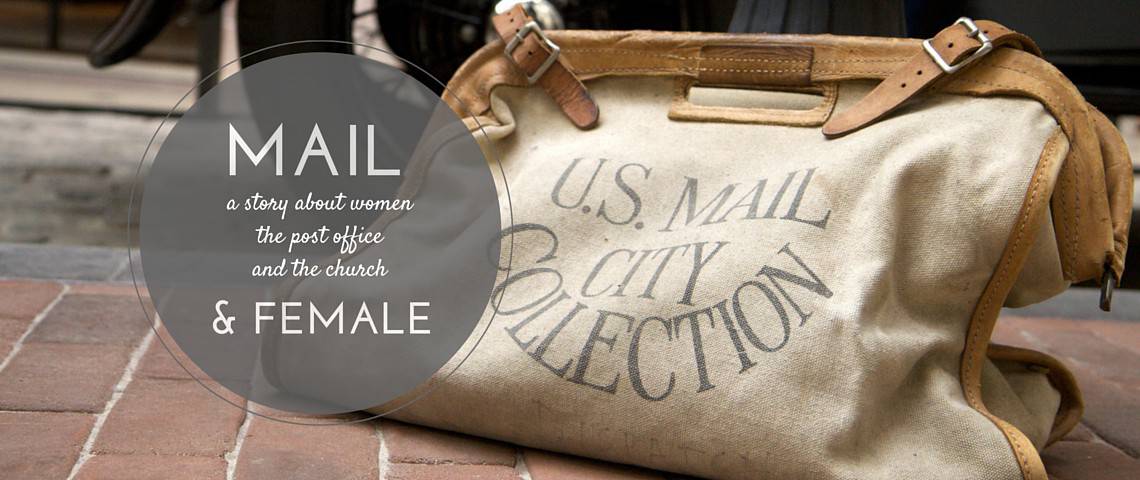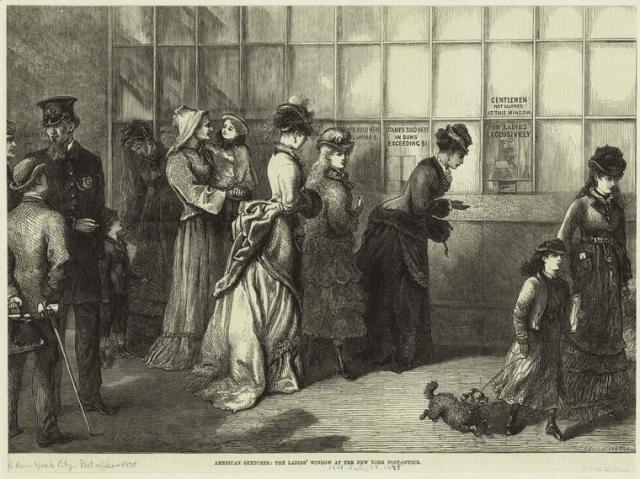The sign above the small post office window in the photo above reads: “Gentlemen not allowed at this window. For Ladies exclusively.” (New York Public Library collection.)
Women in the Post Office
Angela Serratore’s 2012 article on 19th Century women and the rise of modern postal service sheds light on a world foreign to people who use modern electronic communications with ease and from the privacy of their own smartphone.
As she notes in Post Secrets, in the mid-1800s New York City established its first post office, causing public concern over the implications for women.
For the first time, women who had formerly relied on parents, husbands, or even servants to retrieve their personal mail could now retrieve it themselves.
Suddenly, wide swaths of women had access to two dangerous things—the mail and the post office. Anthony Trollope’s 1852 invention of the pillar-box had given British girls a chance to subvert the authority of their scandalized parents by mailing letters in secret, but their New York counterparts who visited the post office could both send and receive mail almost entirely unmonitored by those who might want to regulate their epistolary lives.”
Ladies’ Windows were common, with some offices even having separate entrances for women where they would not rub shoulders with men at all.
A number of contemporary writers warned of the dire consequences of women mailing and receiving letters free of the watchful eye of their husband or parents. One moralist even claimed to have evidence that the practice led to women taking up prostitution because of the danger inherent in “clandestine correspondence with unprincipled men.” (George Ellington, The Women of New York, p. 477)
Serratore notes that eventually public concerns about women visiting the post office without supervision “were mitigated upon the construction of a new, more spatially regulated post office near City Hall, and upon the widespread introduction of home delivery by the Postal Service”. (The original post office was located in a rough part of town that was no place for a lady, and personal servants or private couriers often delivered mail to individual households.)
I don’t think the initiation of post office counters just for women was born of altruistic intent. I think it had to do with the economics of letter writing. Women wrote letters and that meant women needed to buy postage. The more letters women could send and receive, the more stamps they bought.
The effect, though, was a promotion of equal access to communication and speech. Women could now write to friends, put ideas down on paper and send them to magazine editors, coordinate social and political causes with like-minded people far away. No law stopped them. Of course, the law didn’t stop them before these postal services became available. But the prior practices showed how a neutrally written law could be applied so as to keep women from engaging in free speech.
Before: incoming letters passed through the hands of parents or husbands before reaching a woman’s hand, and outgoing mail the same.
After: women had access to the post without scrutiny, enriching communication for everyone.
Which brings me to the connection between 19th Century postal services and the gospel.
Women in the Church
The Bible says that women have the same standing with God that men do.
So in Christ Jesus you are all children of God through faith, for all of you who were baptized into Christ have clothed yourselves with Christ. There is neither Jew nor Gentile, neither slave nor free, nor is there male and female, for you are all one in Christ Jesus. (Galatians 3:26-28.)
Everyone being clothed in Christ means whatever differences existed before no longer matter in your spiritual standing with God. That standing is defined as Jesus – not as being from one place or another, one social status or another, one sex or another – but as Jesus.
It’s like the post office today. The person at the counter no longer considers whether you are a woman or man. All they consider is whether you have a letter to send and the money to buy a stamp.
In God’s kingdom, too, it’s not a matter of whether you are a woman or a man. It’s a matter of whether or not you belong to Jesus. If you do, your place in that kingdom is defined by who Jesus is, not who or what you are.
This is the gospel truth. You can put a stamp on it. It’s ready to mail.





18 responses to “Mail and Female: A Story About Women, the Post Office, and Church”
Super interesting. Makes me think of the fundamentalist idea of “covering.” AKA let me chew up your spirituality and spit it into your mouth for you because you can’t/shouldn’t. When spirituality has to pass through the husband/father before it reaches women all the nutrition is sucked out and we are left with just a hunk of tasteless paste.
It’s like in Hebrews where the writer wants the readers to be eating meat but they are still stuck on milk. We should all be moving toward more meaty ways of living in Christ.
“…your place in that kingdom is defined by who Jesus is, not who or what you are.”
Amen, and thank God for that! 🙂
It seems to me that in order to divide women and men into different roles, you’d have to divide Jesus’ life into male and female aspects and say men can only do the male things and women can only do the female things. That’s nuts. We are all to do the Jesus things.
Excellent point! And how would we identify the male and female aspects, anyway? Not all women like ‘frills and fashion’, and not all men like ‘sports and hunting’. There are gentle, emotional men, and tough, no-nonsense women. Which type is “right”…?
Wonderful correlation.
Thanks, Rev!
Wow, I never would have imagined the post office as being considered such a taboo. Nice connection to the gospel as well. It still boggles the mind that women going to the post office was a cause for concern for some.
in Jane Austen’s Emma there is a scene where Mrs. Elton tries to convince Miss Fairfax that it would be better if the Eltons’ servant picked up her mail for her. Miss Fairfax was having none of it.
One moralist even claimed to have evidence that the practice led to women taking up prostitution because of the danger inherent in “clandestine correspondence with unprincipled men.” Oh my. The things we fret about. This is a great post Tim.
As I read that moralist’s concerns, I wonder what he would’ve thought about SnapChat!
How cool to hear about that…. and how freeing it must have been for those women. I can’t imagine… but I suppose if I was in Saudi Arabia I’d have no trouble identifying with these New Yorkers.
Everyone I know who wants to correspond with anyone else can do so as easy as turning on a phone or laptop and sending the message. The idea that an entire class of people – women in this instance – had to wait for the post office to create windows for them is so foreign to our personal experiences.
Great insight.
And note that even though men and women became both equal at the post office and equal in Christ, neither of these meant that men and women were the same! In other words, equality does not require or even imply sameness, contra the claims of some proponents of gender hierarchy.
Good point, Don. No one said women and men had to write letters exactly the same way. Just that as each wanted to write letters they were entitled to the same postal services.
Love this, Don!
It seems to me that, as well as having a lack of trust in the abilities and morals of women, fear is a big motivator in the suppression of women. Fear of the unknown. What will happen if we give women the same opportunities and freedoms as men? What will happen if women can post their own letters. What will happen if we have a woman preach? And in some countries today: what will happen if women are allowed to drive cars and own mobile phones. People fear the destabilisation of the society they are familiar with.
This is such a shame.
Also, it sickens me that some people think that women can’t be trusted. And conversely, that men are intrinsically more trustworthy than women. Really?
Brilliant, Marg. You’ve articulated the heart of the issue here, that fear is the main driver here, and I agree that it is fear of the unknown and fear of the destablisation of society – which assumes that society is well and good as it is. Yes, what a shame that our vision for society is so small and unlike what Jesus taught the kingdom of God is like!
I would hope that the default position would be that we can trust grown ups – whether women or men – to act like grown ups when given grown up responsibility. Sad that patriarchy defaults to distrust rather than trust when it comes to women.